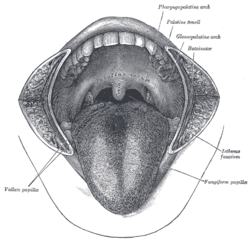Palatopharyngeal arch
The palatopharyngeal arch (pharyngopalatine arch, posterior pillar of fauces) is larger and projects farther toward the middle line than the palatoglossal arch; it runs downward, lateralward, and backward to the side of the pharynx, and is formed by the projection of the palatopharyngeal muscle, covered by mucous membrane.
| Palatopharyngeal arch | |
|---|---|
 The mouth cavity. The cheeks have been slit transversely and the tongue pulled forward. (Pharyngopalatine arch labeled at upper right.) | |
| Details | |
| Identifiers | |
| Latin | arcus palatopharyngeus, arcus pharyngopalatinus |
| TA | A05.2.01.007 |
| FMA | 55025 |
| Anatomical terminology | |
References
This article incorporates text in the public domain from page 1137 of the 20th edition of Gray's Anatomy (1918)
External links
- lesson10 at The Anatomy Lesson by Wesley Norman (Georgetown University)
- Anatomy figure: 34:01-04 at Human Anatomy Online, SUNY Downstate Medical Center
- "Anatomy diagram: 05287.011-1". Roche Lexicon - illustrated navigator. Elsevier. Archived from the original on 2014-01-01.
This article is issued from
Wikipedia.
The text is licensed under Creative
Commons - Attribution - Sharealike.
Additional terms may apply for the media files.